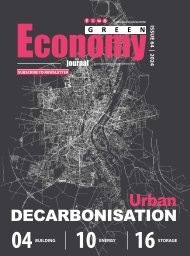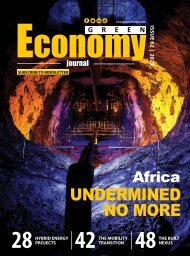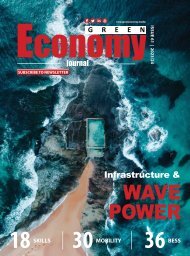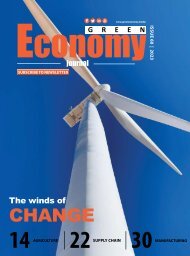Green Economy Journal Issue 63
Create successful ePaper yourself
Turn your PDF publications into a flip-book with our unique Google optimized e-Paper software.
SKILLS<br />
EWSETA<br />
SPECIALISED<br />
TRAINING<br />
introduces<br />
for renewable energy<br />
and water management<br />
The Energy and Water Sector Education and Training Authority<br />
(EWSETA) is developing and implementing specialised renewable<br />
energy and water resource management training programmes, in a<br />
bid to align with industry needs and technological advancements.<br />
BY EWSETA<br />
The EWSETA CEO, Mpho Mookapele, engaged with media on<br />
the back of growing research that macroeconomic trends<br />
and technological advancements will continue to disrupt<br />
labour markets worldwide.<br />
The International Energy Agency (IEA) last year revealed that<br />
4.7-million more people were employed in clean energy globally in<br />
2022, than in 2019. Concerns around the “green skills gap”, as it has<br />
become known, have been echoed by a recent report from LinkedIn<br />
which shows that only one in eight employees globally possess one<br />
or more green skills.<br />
“We don’t want to leave South Africa’s young people and workforce<br />
behind; it is important for businesses to share their skills plans<br />
with us, so that we can capacitate learners accordingly. Together<br />
with government and private entities we are collaborating to<br />
fast-track skills development initiatives that seek to upskill and reskill<br />
employees to meet the workforce demands of the changing energy<br />
and water sectors,” says Mookapele.<br />
In the rapidly evolving energy sector, EWSETA currently develops<br />
qualifications that will respond to the gaps in the curriculum. The<br />
skills programmes that will be introduced include wind turbine<br />
operation, biogas installation, microgrid and battery energy storage<br />
operation, solar PV manufacture, design and installation.<br />
Among the courses in the pipeline are water works management,<br />
solar panel installation, wind turbine maintenance, and other green<br />
energy solutions. Mookapele says, “When the sector needs certain<br />
skills, we are committed to working together with industry to<br />
build these capabilities. Ultimately, we exist to ensure industries<br />
are successful. As such we aim to move with agility to ensure that<br />
these programmes and qualifications are concluded and submitted<br />
for registration with the Quality Council for Trades and Occupations<br />
(QCTO) and the South African Qualifications Authority (SAQA).”<br />
Due to the boom in the photovoltaic sector, because of more<br />
people going solar, the SETA is also currently working with industry<br />
to ensure that minimum skills requirements are mandated for<br />
the PV <strong>Green</strong> Card training. The South African PV <strong>Green</strong> Card is<br />
EWSETA CEO, Mpho Mookapele.<br />
a quality assurance standard for solar PV installers, and it is<br />
hoped that these minimum requirements will mitigate against<br />
substandard installations.<br />
The EWSETA is looking for partners that will enable retro-fitting<br />
technical workshops for Technical and Vocational Education and<br />
Training (TVET) colleges, to ensure that they are responding to the<br />
tech-developments in the industry.<br />
In the water sector, the EWSETA partners with water boards,<br />
municipalities and private industries to develop water-related<br />
qualifications that aim to address the challenges around clean<br />
drinking water and wastewater treatment plants.<br />
In response to the evolving water landscape, a Water Works<br />
Management National Qualifications Framework 6 (NQF) has<br />
been registered. EWSETA is in the process of developing a<br />
water resource management qualification at NQF level 8 and<br />
a skills programme for water conservation practitioners.<br />
Advances in water treatment processes will necessitate the<br />
development of qualifications that will respond to the future<br />
treatment landscape. These future technologies include biological<br />
water treatment and smart water grids, among others.<br />
“As the world transitions to net zero, the traditional career<br />
landscape is changing, and it is up to all of us to future-proof our<br />
workforce. EWSETA is taking strides to harness the opportunities<br />
that these exciting changes present,” concludes Mookapele.<br />
EWSETA<br />
EWSETA is a skills development authority serving the energy<br />
and water sectors. It is one of 21 Sector Education and Training<br />
Authorities (SETAs) established in South Africa in terms of the<br />
Skills Development Act of 1998 – amended. It plays a crucial<br />
function in ensuring that the National Skills and Development<br />
Strategy is executed within the energy and water sectors.<br />
51

















